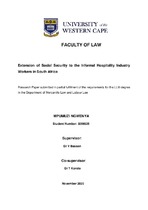| dc.contributor.advisor | Basson, Y | |
| dc.contributor.author | Ngwenya, Mpumuzi | |
| dc.date.accessioned | 2021-04-06T07:57:09Z | |
| dc.date.available | 2021-04-06T07:57:09Z | |
| dc.date.issued | 2020 | |
| dc.identifier.uri | http://hdl.handle.net/11394/8128 | |
| dc.description | Magister Legum - LLM | en_US |
| dc.description.abstract | The hospitality industry is one of the largest economic sectors in the world.1 As a result, it is one of the top employment contributors, with its Travel and Tourism sector accounting for an estimated 10.3% of global GDP, translating to a US$8.9 trillion contribution to the world’s GDP and 330 million jobs in 2019.2 In the context of South Africa, the tourism industry also plays a crucial role in economic growth and job creation. Tourism in South Africa accounted for 2.8% of GDP in 2019,3 and employed an estimated 709 000 individuals.4 Therefore, the importance of this colossal industry in economic growth and development, coupled with its potential in poverty reduction cannot be overemphasised. | en_US |
| dc.language.iso | en | en_US |
| dc.publisher | University of the Western Cape | en_US |
| dc.subject | Hospitality industry workers | en_US |
| dc.subject | Hotels | en_US |
| dc.subject | Informal workers | en_US |
| dc.subject | Migrant workers | en_US |
| dc.subject | Poverty | en_US |
| dc.title | Extension of social security to the informal hospitality industry workers in South Africa | en_US |
| dc.rights.holder | University of the Western Cape | en_US |

